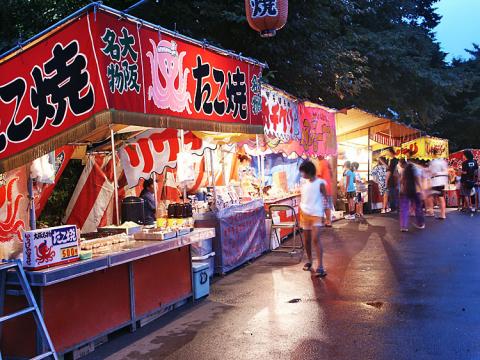Tempest’s Downpour – Anime In-Jokes 7: Holidays and Festivals
Dedicated to Drago.
It seems like every three episodes or so, anime characters have a day off from school or some excuse to wear pretty kimonos in the evening and walk around booths playing carnival games in a Japanese version of a Renaissance Fair. Although this is a considerable stretch from reality given that the Japanese school year is 60 days longer than America’s, Japan does celebrate a good number of holidays.
Several of these holidays correspond with celebrations we have here in the West: New Year’s, Valentine’s Day, Christmas, etc. However, given that this is Japan, these holidays are celebrated a little differently.
- New Year’s Day: people eat traditional New Year’s foods while children receive a New Year’s money packet. Poetry and games are traditions.
- Valentine’s Day: women give chocolates to their romantic interests as well as “obligation chocolates” to their male coworkers.
- Labor Thanksgiving Day (November 23): celebrated like May Day is celebrated in the West.
- Christmas Eve and Christmas: considered to be a more romantic holiday celebrated with one’s love rather than family.
- Omisoka: New Years Eve is almost as important as the day itself. Businesses celebrate “Forget-the-year” parties, houses are thoroughly cleaned, bills are paid and promises are fulfilled. Special noodles are served that night and a gong is rung 108 times.
Then there are the holidays that we only know about because of anime. Students seem to run wild when Golden Week approaches – they get an entire week off school, which is a pretty big deal in Japan given that summer vacation is only a month long.
- Doll Festival/Girls’ Day (March 3): this day celebrates young girls. Families pray for their happiness and prosperity. Dolls are set up within the house to represent the emperor, empress, attendants and musicians in the hopes of warding off evil spirits from the girls. The dolls are taken down before March 4th because superstition states that girls will have late marriages if the dolls are kept on display too long.
- White Day: the response to Valentine’s Day, where the man returns the favor. It’s actually a marketing scam to get people to buy white chocolate.
- Hanami (April): the cherry blossom festival season. People celebrate with food and beautiful lanterns at night. Festivals are held throughout Japan, and people tend to picnic underneath cherry trees.
- Golden Week (April 29, May 3-5): this is an interesting one. It is actually a series of holidays that happen to be grouped closely enough together that people typically take the entire week off from work or school. Because of this, people spend a lot more time going to the movies. The film industry dubbed this series of holidays “Golden Week” because of the high viewership ratings. Golden Week involves Showa Day, Constitution Memorial Day, Greenery Day and Children’s Day.
- Tanabata (July 7): This holiday celebrates the romance between Orihime and Hikoboshi, two stars who can only meet once a year and only if it doesn’t rain on the seventh day of the seventh month. People celebrate by attending festivals and writing wishes on strips of paper that are then attached to bamboo.
The rest of these holidays may get a passing mention in anime. Some of them are strictly Buddhist holidays, while the rest are minor days in which people still attend school or go to work.
- Coming of Age Day (second Monday of January): this is a celebration of the people who have reached the age of majority, 20.
- National Foundation Day (February 11): this is the day to commemorate the foundation of Japan by Emperor Jimmu in 660 BCE.
- Parinirvana Day (February 15): this is a Buddhist holiday celebrating the day Buddha achieved the final level of Nirvana. (please keep in mind that not every Japanese person is Buddhist or practices Buddhist holidays.)
- Vernal Equinox (March 20): a celebration of spring and nature.
- Buddha’s Birthday (April 8 or May 8): a Buddhist holiday celebrating Gautama Buddha’s birthday. Followers pour a hydrangea beverage over statues of Buddha decorated with flowers.
- Marine Day (Third Monday of July): a day to offer thanks to the ocean which has sustained Japan for all time.
- Bon (July or August 13-15): this traditional Buddhist holiday is meant to comfort the souls of deceased ancestors. Since it’s in the summer, people typically have family reunions and don yukatas. At the end, paper lanterns are floated down rivers, symbolizing the return of souls to the realm of the dead.
- Respect-for-the-Aged Day (Third Monday in September): this holiday is a celebration and respect for elders and their wisdom.
- Autumnal Equinox (September 23): a day to remember those who have passed.
- Tsukimi (September and October): these harvest festivals honor the moon and its cycles. These festivals are celebrated on the 15th day of the eight month of the lunisolar calendar, and the 13th day of the nineth month.
- Health and Sports Day (second Monday of October): a day that promotes wellness and activity of the mind and body.
- Culture Day (November 3): a holiday that celebrates the arts via cultural exhibits and festivals. This is formerly the birthday of Emperor Meiji.
- Emperor’s Birthday (December 23): a celebration of the current Emperor’s birthday.
Japan originally functioned under the Chinese lunisolar calendar, until Japan adopted the Gregorian calendar (the one we use) in 1873. Japan ceased officially celebrating the Chinese New Year, although not every anime got that memo (Fruits Basket).
Because the lunisolar calendar follows the moon cycles instead of the sun cycles, it does not have 365 days in its year. Also instead of having an extra day on the leap year, the lunisolar calendar has an extra month. Because it does not keep pace with the solar calendar, it takes a full 19 years for the two calendars to revolve around the same cycle. Therefore, if you are born on February 3 in the Gregorian calendar, you will not celebrate your birthday on the lunarsolar calendar on the same day until you are 19.
The Chinese New Year typically falls between January 21 and February 20 on the Gregorian calendar. The mythology behind it is that the mythical beast Nien would devour livestock, crops and even people. People put food out on their door to appease the monster, until one day Nien was scared away by a little child wearing red. Villagers began celebrating using the color red and firecrackers to keep away Nien.
People celebrate by cleaning their houses to keep away bad luck and visiting family. The holiday is still celebrated with red and lots of interesting sights, like dancing lions and dancing dragons. Decorations with good-luck words hang from every pole and window.
Japan has a culture rich in elements that are entirely alien to the West: especially regarding who and what is celebrated. Perhaps that’s why we find anime so intriguing.
http://tvtropes.org/pmwiki/pmwiki.php/Main/JapaneseHolidays
http://en.wikipedia.org/wiki/Japanese_festivals
http://en.wikipedia.org/wiki/Golden_Week_%28Japan%29
http://en.wikipedia.org/wiki/Lunisolar_calendar




















[…] This post was mentioned on Twitter by Rose Little, Kate Florcot, Kodie Pipps, Katie Kresner, 91.8 The Fan and others. 91.8 The Fan said: Tempest’s Downpour – Anime In-Jokes 7: Holidays and Festivals @ http://tinyurl.com/22qrpcr Check it out! […]
I love white chocolate o_o …
Very interesting read…I had not heard of a couple of these =D
Wow I knew they had lots of traditional festivals but never quite seen them listed and detailed like this. Very nice. The Bon festivals are kind of special. Also have many localized ones specific to an area especially during the summer – Hanabi(fireworks) often part too.
“Dedicated to Drago.”
wut
Because he asked me to write it.
What Cameron said…. O_o
“Japan has a culture rich in elements that are entirely alien to the West: especially regarding who and what is celebrated. Perhaps that’s why we find anime so intriguing.”
Agreed, it’s certainly one appeal-the fictional world is made a bit more believable by being bolstered by (alliterative score +500!) celebrations and lifestyles that are often fascinating and lovely~ Hanami, Tanabata (lovely picture bonus +200!), and Bon sound particularly interesting to attend, I think. Also, I feel like there a Boy’s Day to match Girl’s Day?
[…] mentioned these two holidays in a previous article article, but there’s a lot more depth to cover. So bust out that egg nog once again as we settle into […]